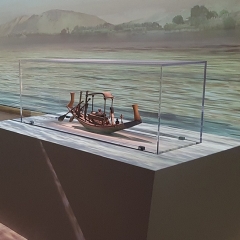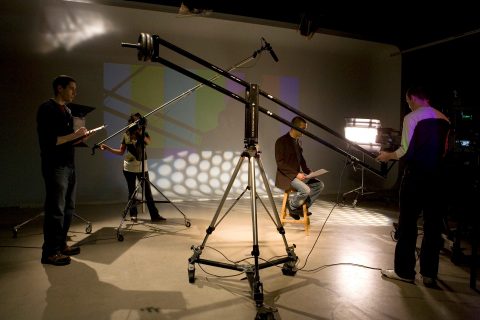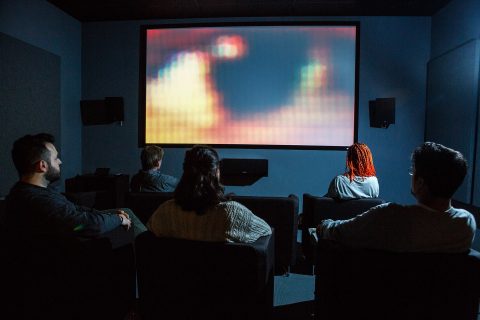Film Animation (BFA)
Why study Film Animation?
Discover how to articulate your artistic visions as you master a versatile art form. Concordia’s multidisciplinary Film Animation program provides a solid foundation in the art of creative, independent frame-by-frame filmmaking. Our Fine Arts approach to film animation, taught by international award-winning professor-practitioners, emphasizes artistic cross-pollination, innovation and experimentation.
Our students learn the fundamentals of animated movement, stop motion, under camera animation, storyboarding, drawing, animated documentary, sound for animation, creative compositing and other original approaches to the medium. You’ll graduate with the artistic knowledge and discipline to create festival-ready animated films, think critically about your work and connect to the thriving community of independent artist-animators in Montreal and around the world.
With an Oscar win, eleven nominations, and hundreds of prestigious awards won by past and present faculty and students, we’re proud of the international acclaim our alumni enjoy as directors, producers, editors and designers of the world’s most creative animation.
Program highlights
- Participate in the Concordia Film Festival, a student-run festival showcasing student work.
- Numerous opportunities for gaining hands-on experience through internships
Special funding for out-of-province students
Up to $4000 for undergraduate programs.
Program structure
A Bachelor of Fine Arts degree takes a minimum of three or four years (90 – 120 credits) of full-time study, depending on your academic background.
Program options
- Major in Film Animation (60 credits)
- Minor in Film Animation (30 credits)*
*For current Concordia students only. Students may apply to the minor for their second year of study.
Courses
Courses emphasize experimentation with a variety of techniques and materials. Our acclaimed faculty provide students with intensive training in a diverse range of traditional and digital animation techniques, including:
- Classical animation
- Puppet animation
- 3D digital animation
- Direct animation
- Experimental animation
- Animated documentary
- Animated installation
- Sound design & music composition
This rigorous approach to classical and digital animation processes emphasizes cross-pollination experimentation, and an independent spirit, making the Film Animation program one of the most versatile training programs in its field.
For a list of required courses, please download the Program Guide according to year of entry.
Internships and other study opportunities
International study opportunities
Concordia University offers students the opportunity to take part in an International Student Exchange Program (ISEP) that will count for credit towards their Concordia degree, while paying the same tuition fees they do at home and possibly receiving funding. International study opportunities bring cultural diversity and enrichment through immersion in the programs of study at Concordia’s partner institutions.
Professional internships
Internships provide students with the opportunity to pursue work in the film industry, film research, archival work, editing film publications, or writing film criticism. Consult the Undergraduate Calendar or Graduate Calendar for details about program specific requirements and prerequisites.
Independent studies
Students may explore specific areas of film through independent study. Consult the Undergraduate Calendar or Graduate Calendar for details about program specific requirements and prerequisites.
Admission criteria
This program is available for Fall admission only.
Minimum cut-off averages and course requirements
- Quebec CEGEP: DEC
- High School: C+
- ACT or SAT is NOT required
- Canadian curricula course requirements
- Accepted international qualifications
- International Baccalaureate (IB) diploma: 26
- International Baccalaureate Career-related Programme (CP): 26
- Baccalauréat français: 11
- British system of education (GCE):
- A-levels: At least two A-level exams CD or
- AS-levels: At least 4 AS-level exams with equivalent results or
- BTEC: Level 3 Diploma or Extended Diploma in a related subject area with equivalent results
- Additional information for British System of Education (GCE) applicants
- University Transfers (internal/external): C
Additional requirements for admission
Applicants must submit additional requirements for admission directly to the department.
- Letter of intent
- Portfolio
Minimum cut-off averages should be used as indicators. The cut-off data may change depending on the applicant pool. Applicants who meet the stated minimum requirements are not guaranteed admission to these programs.
Application deadlines
It’s not too late to apply
Most undergraduate programs are still accepting applications for fall 2025.

FALL ENTRY (September)
Deadline: March 1
International applicants: Apply no later than February 1 to allow time for immigration document processing. However, applying earlier is strongly recommended. Immigration processing times vary by country, and delays could prevent you from starting your studies on time.

WINTER ENTRY (January)
Admission to this program is available for the Fall Term only.
We reserve the right to close admission to a program at any time after the official deadline without prior notice.
Funding note
Quebec residents who enroll in certain programs and meet the eligibility criteria may apply for funding of $2,500 per term through the Quebec Perspective Bursary (Bourse Perspective Quebec).
United States students: A U.S. Federal Student Aid-eligible version of this program is offered. This version meets all U.S. regulations (such as no co-operative education or e-courses) for eligible programs.
After your degree
Our students have gone on to become some of the world’s leading independent animation filmmakers. Many work with the National Film Board of Canada or with animation studios and visual effects companies around the world. Your degree can also lead to career paths such as:
- Animation Director
- Storyboard artist
- Character designer
- Web animator
- CGI special effects supervisor
- 3D modeller
- Stop-motion, 2D and 3D animator
Student story

Eliane Ashkar
Major in Film Animation
Eliane Ashkar’s passion for film animation brought her to a new city.
Other programs of interest

In your first year, you make a film. Every year, you work on the making of a film. In this competitive program, you’ll develop your craft and vision as a filmmaker under the supervision of established filmmakers, media artists and scholars who instruct and mentor you.
Department
Mel Hoppenheim School of Cinema
Faculty

Film and Moving Image Studies will teach you how to read our visual culture and speak the dominant creative language of the last century.
Department
Mel Hoppenheim School of Cinema
Faculty


